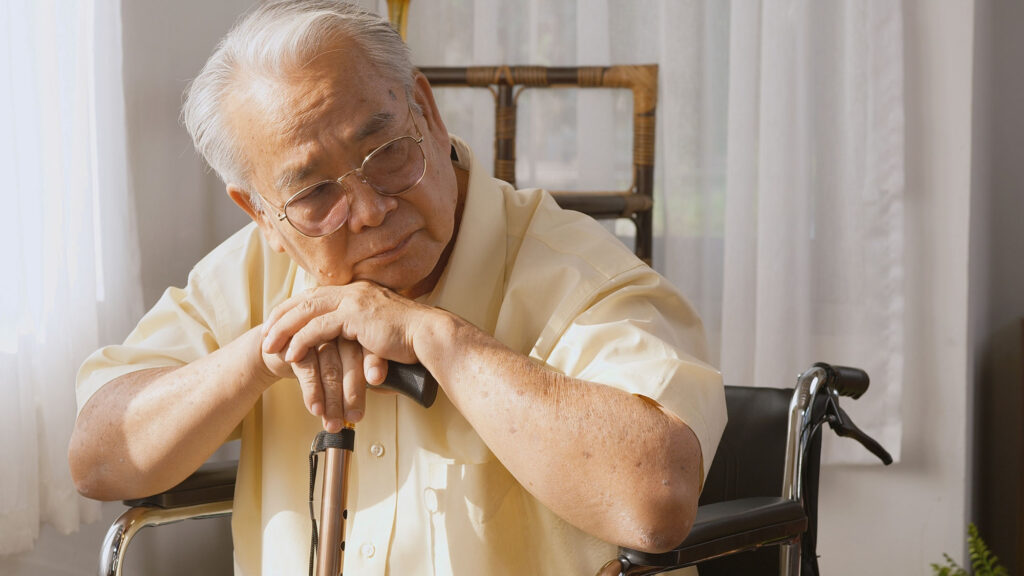5 Ways Social Isolation Can Hurt Your Senior Parent

If your senior parent is living independently, you may have thought about protecting them from things like slippery floors or other hazards, but you may have missed one of the biggest hazards that seniors living alone face- loneliness.
Social isolation and loneliness are reaching epidemic levels among seniors who are living independently. And the health impacts of being lonely can be severe for your mom or dad. Being lonely can increase your senior parent’s risk of developing dementia, heart disease, anxiety, depression, and other illnesses.
Most family caregivers just can’t be the only source of social interaction that their parent has. With work, kids, and other responsibilities, you may not be able to spend as much time with your mom or dad as you’d like.
Companion care at home is a great resource that can help your mom or dad get the social interaction they need. If your mom or dad has companion care at home services, they will get regular visits from a companion caregiver who is there to keep your mom or dad socially engaged.
Together, a companion and your senior parent can play board games or cards, do puzzles, watch TV or movies, listen to audiobooks, talk about their lives, and hang out like friends. Companion care at home services means that you won’t have to worry about your mom or dad being lonely when you can’t get there.
Having companion care at home can help protect your mom or dad from the dangers of social isolation like:
1. Increased Risk of Heart Problems
Loneliness and isolation can put extra stress on the body, including the heart. Studies have shown that seniors who are socially isolated have a higher risk of heart disease, high blood pressure, and stroke.
Emotional stress also triggers the release of hormones like cortisol, which can strain the cardiovascular system over time. For seniors like your mom or dad, this increased stress can lead to heart-related health issues. It can also make their existing symptoms worse if they have heart disease.
2. Weakened Immune System
Feeling lonely or socially isolated can weaken your mom or dad’s immune system. Chronic loneliness also increases stress hormones, which suppress the body’s ability to fight off infections.
Seniors with weakened immune systems are more likely to get sick, recover more slowly, or develop chronic illnesses. This can lead to a cycle where poor health makes them feel even more isolated. If your mom or dad is recovering from a serious illness, they need social contact more than ever.
3. Increased Risk of Depression and Anxiety
Loneliness often leads to emotional distress, which can develop into depression or anxiety. Seniors who feel disconnected from loved ones may experience sadness, hopelessness, or irritability. If your mom or dad has recently lost a partner and is adjusting to being alone all the time, they really need social interaction.
Depression doesn’t just affect mood—it can reduce energy levels, appetite, and motivation to stay active or healthy. Untreated, it can worsen mental and physical health, creating a dangerous cycle.
4. Cognitive Decline
Social interaction is essential for keeping the brain active and sharp. Without regular engagement with others, seniors are at a higher risk of cognitive decline, including memory problems and dementia.
Loneliness reduces mental stimulation, which can slow thinking and problem-solving skills. Over time, this lack of stimulation can lead to significant cognitive impairments, making everyday tasks harder to manage.
5. Poor Lifestyle Choices
Loneliness can also lead to unhealthy habits. Seniors who feel isolated may lose motivation to cook nutritious meals, exercise, or maintain their hygiene. They might turn to smoking, overeating, or excessive alcohol use to cope with their feelings of loneliness. These lifestyle choices can lead to chronic conditions like diabetes, obesity, or respiratory issues, further harming their health.
If you or an aging loved one are considering Companion Care at Home in Keyport, NJ, please contact the caring staff at Lares Home Care (732) 334-3323.
- The Best Ways To Keep Your Senior Parent From Getting Bored In The House - April 7, 2025
- Home Care Helps Seniors Eat Healthy Meals - March 26, 2025
- Senior Home Care Helps Seniors With Low Vision Live Independently - March 6, 2025
